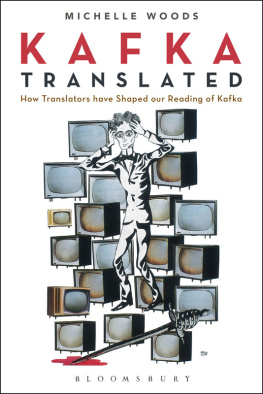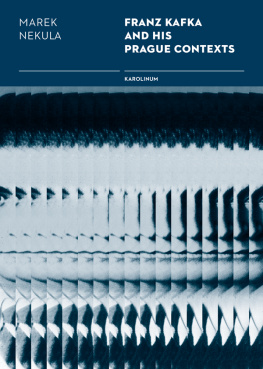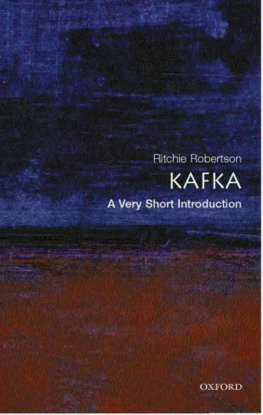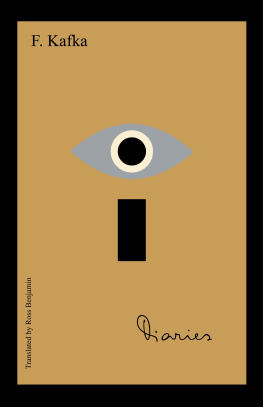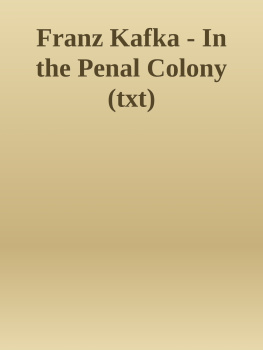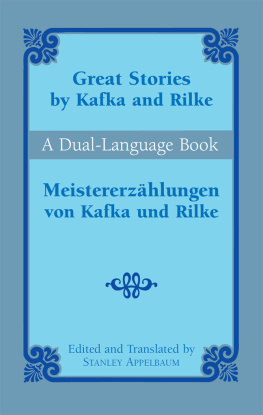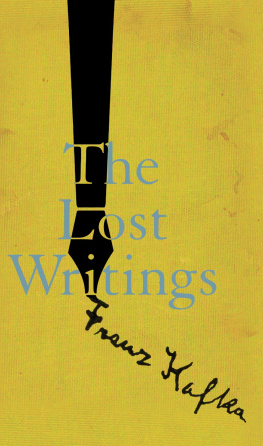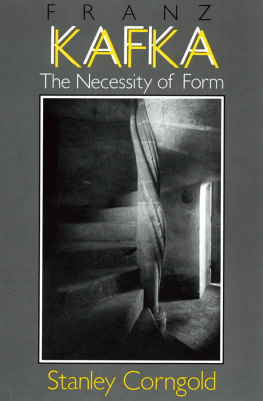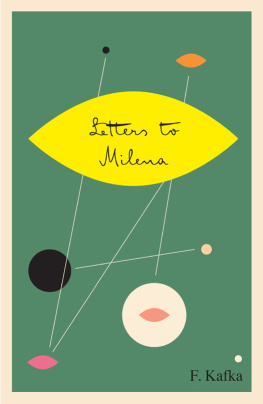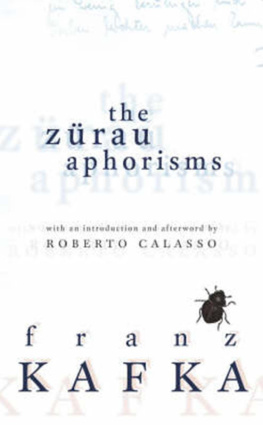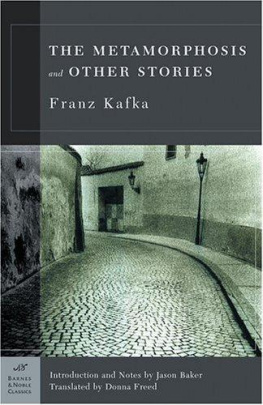Kafka Franz - Kafka translated: how translators have shaped our reading of Kafka
Here you can read online Kafka Franz - Kafka translated: how translators have shaped our reading of Kafka full text of the book (entire story) in english for free. Download pdf and epub, get meaning, cover and reviews about this ebook. City: New York;NY, year: 2014, publisher: Bloomsbury USA, genre: Detective and thriller. Description of the work, (preface) as well as reviews are available. Best literature library LitArk.com created for fans of good reading and offers a wide selection of genres:
Romance novel
Science fiction
Adventure
Detective
Science
History
Home and family
Prose
Art
Politics
Computer
Non-fiction
Religion
Business
Children
Humor
Choose a favorite category and find really read worthwhile books. Enjoy immersion in the world of imagination, feel the emotions of the characters or learn something new for yourself, make an fascinating discovery.
- Book:Kafka translated: how translators have shaped our reading of Kafka
- Author:
- Publisher:Bloomsbury USA
- Genre:
- Year:2014
- City:New York;NY
- Rating:4 / 5
- Favourites:Add to favourites
- Your mark:
- 80
- 1
- 2
- 3
- 4
- 5
Kafka translated: how translators have shaped our reading of Kafka: summary, description and annotation
We offer to read an annotation, description, summary or preface (depends on what the author of the book "Kafka translated: how translators have shaped our reading of Kafka" wrote himself). If you haven't found the necessary information about the book — write in the comments, we will try to find it.
Kafka translated: how translators have shaped our reading of Kafka — read online for free the complete book (whole text) full work
Below is the text of the book, divided by pages. System saving the place of the last page read, allows you to conveniently read the book "Kafka translated: how translators have shaped our reading of Kafka" online for free, without having to search again every time where you left off. Put a bookmark, and you can go to the page where you finished reading at any time.
Font size:
Interval:
Bookmark:

Kafka Translated
Kafka Translated
How Translators have Shaped
our Reading of Kafka
Michelle Woods

Bloomsbury Academic
An imprint of Bloomsbury Publishing Inc
1385 Broadway | 50 Bedford Square |
New York | London |
NY 10018 | WC1B 3DP |
USA | UK |
www.bloomsbury.com
Bloomsbury is a registered trademark of Bloomsbury Plc
First published 2014
Michelle Woods, 2014
All rights reserved. No part of this publication may be reproduced or transmitted in any form or by any means, electronic or mechanical, including photocopying, recording, or any information storage or retrieval system, without prior permission in writing from the publishers.
No responsibility for loss caused to any individual or organization acting on or refraining from action as a result of the material in this publication can be accepted by Bloomsbury or the author.
Library of Congress Cataloging-in-Publication Data
Woods, Michelle, 1972
Kafka Translated : How Translators have Shaped our Reading of Kafka / Michelle Woods.
pages cm
Includes bibliographical references and index.
ISBN 978-1-4411-9771-9 (pbk. : alk. paper) -- ISBN 978-1-4411-4991-6 (hardback : alk. paper) 1. Kafka, Franz, 1883-1924--Translations--History and criticism. 2. Translating and interpreting. I. Title.
PT2621.A26Z9858 2013
833.912--dc23
2013029972
ISBN: 978-1-4411-3195-9
Typeset by Fakenham Prepress Solutions, Fakenham, Norfolk NR21 8NN
And so there I was on the platform, under a warm,
pale-blue sky, wearing a thick woolen scarf, a cloth
cap, and a new autumn coat I had just bought in
order to look respectable in Armenia. Muscovite
experts in sartorial matters had looked me up and
down and said, Well, its hardly chic, but itll do
for a translator.
Vasily Grossman
I hear the voice, my voice! [] I dont know how it
happens, after all I only read it with my eyes, so
how did my blood find out so quickly, so quickly
that my veins are already hot from circulating its
words?
Kafka, on receiving a translation of his
work from Milena Jesensk
For my mother,
Yvonna Woods.
Contents
While spending four years in Kafkas company was mostly a delight, I was glad to do it with the company and support of so many. A huge thanks to my editor, Haaris Naqvi, whose interest and patience allowed the project to develop. I am completely indebted to Mark Harman and Michael Hofmann, who were both so gracious, kind and interesting. Id like to thank the Provosts Office and CRAL at SUNY New Paltz for an award to pursue research at St. Andrews Universitys Willa Muir Archive and I would like to thank the librarians at St. Andrews for their help. I am very grateful also to the stav pro eskou literaturu for a stipendium that enabled me to pursue research on Milena Jesensk in Prague. I would like to thank Professor Gerald Sorin and the Resnick Lecture series for a chance to try out my material on Frantiek Soukup. Parts of the book have appeared in different form elsewhere: Reassessing Willa Muir: Her Role and Influence in the Franz Kafka Translations. Translation Studie s. 4:1 (2011) 5871; The Factional Translator: Willa Muir. Transfiction and beyond , edited by Klaus Kaindl and Karlheinz Spitzl. Amsterdam: John Benjamins, 2013; and Translator, Writer and Wronged: Milena Jesensk Unconstructed. Translation Right and Wrong , edited by Susana Bay Belenguer, Eilen N Chuilleanin, and Cormac Chuilleanin. Dublin: Four Courts Press, 2013. Thank you to the wonderful English Department at New Paltz and to my students and their discussions in three classes I taught over the last few years at New Paltz: Horror and Humor in European Fiction, and my two Major Authors: Kafka classes. A special thanks to my student research assistant, Mike Herrera.
None of this would be possible without the love and support of my husband, Michael Reisman, who has only occasionally seen me like Kafkas Poseidon peek out from a desk full of papers in the last few months.
Read it sucka, Walon (Steve Earle) says to Bubbles (Andre Royo) in The Wire , and hands him one of Franz Kafkas aphorisms, which Bubbles reads out loud:
You can hold back from the suffering of the world, you have free permission to do so, and it is in accordance with your nature, but perhaps this very holding back is the one suffering you could have avoided (Kafka quoted in Simon 2008).
It is a beautiful aphorism, at once pulsating with meaning and somehow intangible. We obscurely feel, we bet, we practically know there is something more going on in a story, Michael Hofmann writes, something probably to do with sex or violence or families or metaphysics, but were damned if we know what it is (Hofmann 2008: x). It is this over-plus of meaning on Kafkas side that gives rise to the profusion of interpretations, he adds (x). Bubble squints at the aphorism Walon has handed him: Fonzie Kafka. Who he? Bubbles asks. Some writer, Walon says. Read his books? Fuck no. Bubbles is perplexed. What it mean to you? he asks. I dunno, Bubs, Walon says. Whats it mean to you? (Simon 2008).
The lure of interpreting Kafkas work is in this perplexed refrain: What it mean to you? I dunno, Bubs. Whats it mean to you? As Adorno famously wrote: Each sentence says interpret me, and none will permit it (Adorno 1981: 246), something Peter Heller also argues: that, in Kafkas work, the subjection to the experience of not understanding seems to me to be the or at least a major point of reading Kafka. He is drawn into, and draws the reader into, the dramatization of the guilty failure to arrive, to communicate, to understand (Heller 1977: 382). Heller questions as he believes Kafkas work does what we actually mean by understanding: Apparently, he writes, to interpret, to translate the unfamiliar into terms familiar and hence reassuring and meaningful (386). But this does not mean that such interpretations or translations are true, and it is because we have a sense that these rationalizations are just that (386), that Kafkas work continues to intrigue us, because we recognize very well what Kafka is saying, for he scratches the wounds of our lives where they itch (385). We dont understand life, in other words, and are constantly, and finally, ineffectively, looking to translate it into answers. Reading Kafka is a re-enactment of that sense of failure and misunderstanding. Adorno describes the effect in cinematic terms:
the contemplative relation between text and reader is shaken to its very roots. His texts are designed not to sustain a constant distance between themselves and their victim but rather to agitate his feelings to a point where he fears that the narrative will shoot towards him like a locomotive in a three-dimensional film (Adorno 1981: 246).
The place of understanding, however, is in the language; Kafkas authority is textual, Adorno writes. Only fidelity to the letter, not oriented understanding, can be of help. In an art that is constantly obscuring and revoking itself, ever determinate statement counterbalances the general proviso of indeterminateness (247). If we consider again the aphorism Walon gives Bubbles through two different translations, we can begin to understand what Adorno argued:
D u k annst D ich zurckhalten v on d en L eid en d er W elt, d as ist D ir fr ei gestellt und entspricht Dei ner Natur, aber v iell ei cht ist gerade d ieses Zurckhalten d as ei nzige L eid , d as D u verm eid en k nntest.
Font size:
Interval:
Bookmark:
Similar books «Kafka translated: how translators have shaped our reading of Kafka»
Look at similar books to Kafka translated: how translators have shaped our reading of Kafka. We have selected literature similar in name and meaning in the hope of providing readers with more options to find new, interesting, not yet read works.
Discussion, reviews of the book Kafka translated: how translators have shaped our reading of Kafka and just readers' own opinions. Leave your comments, write what you think about the work, its meaning or the main characters. Specify what exactly you liked and what you didn't like, and why you think so.

